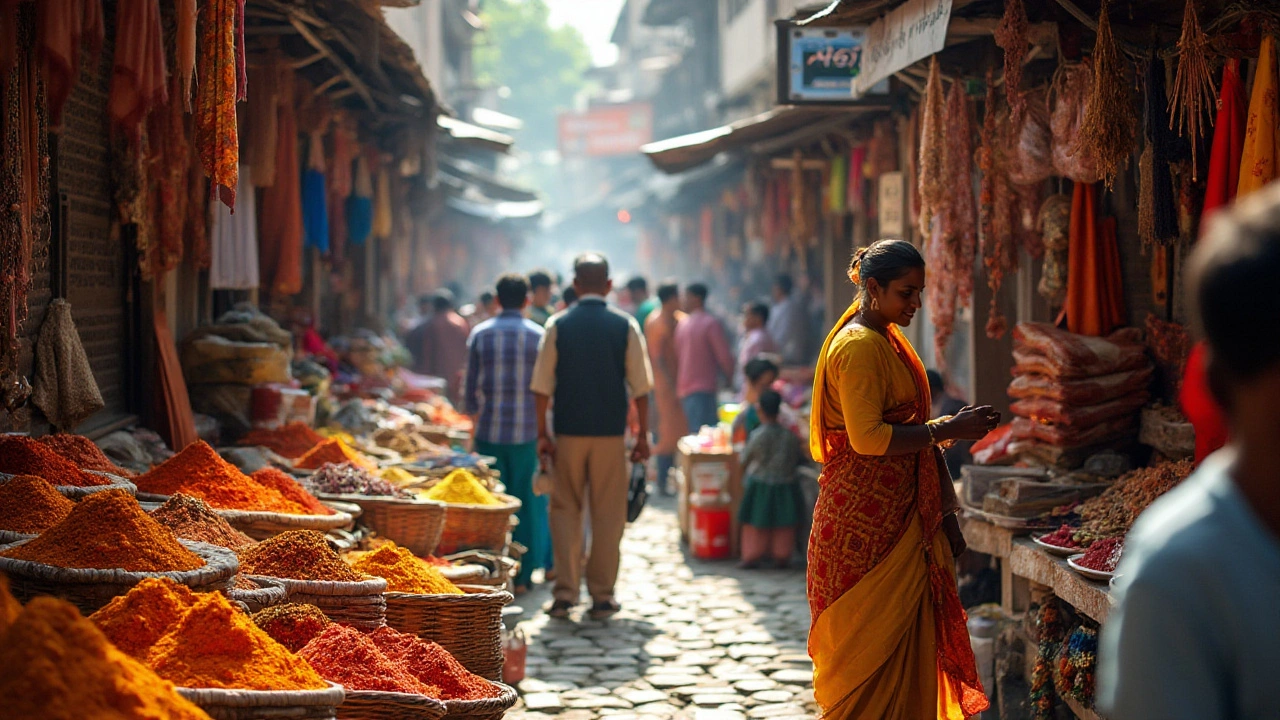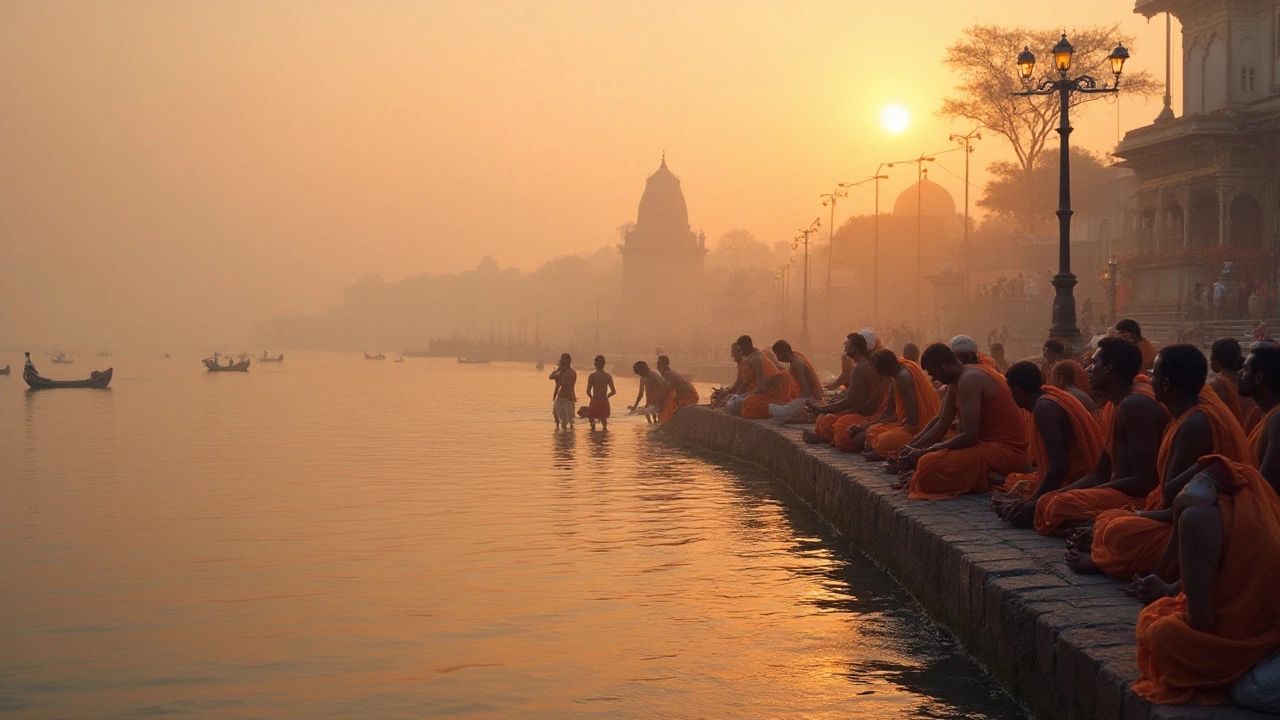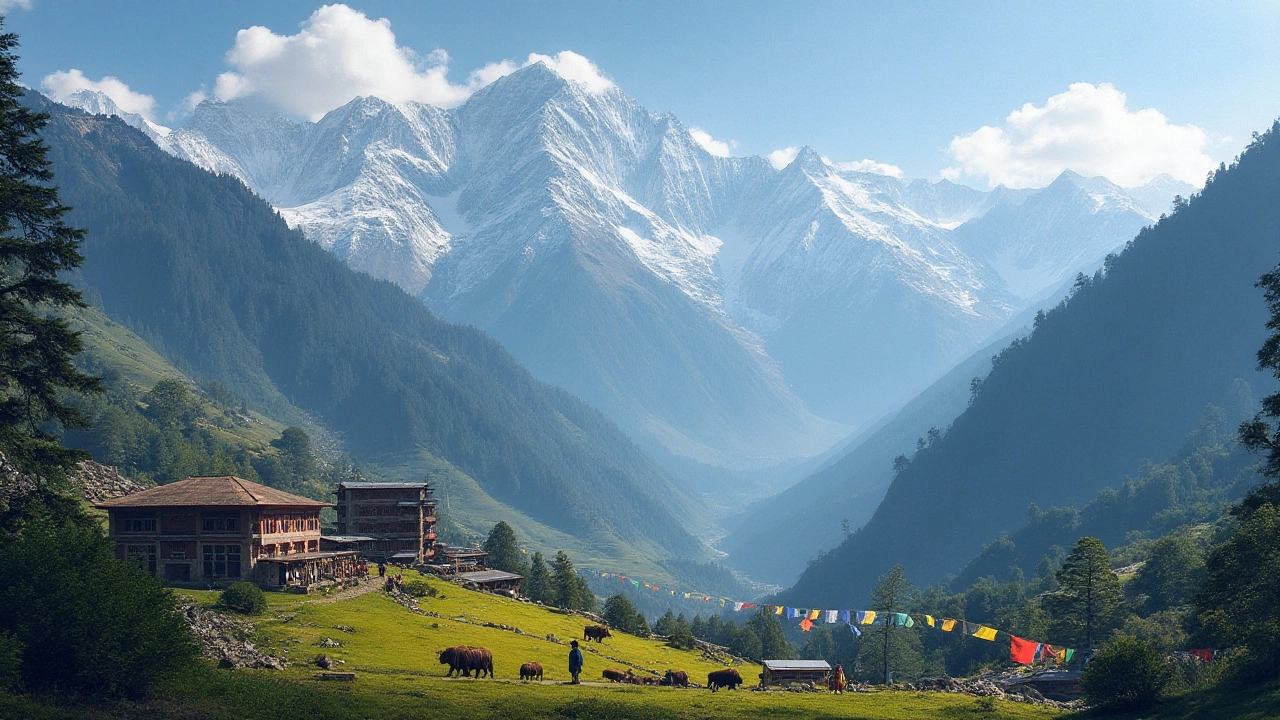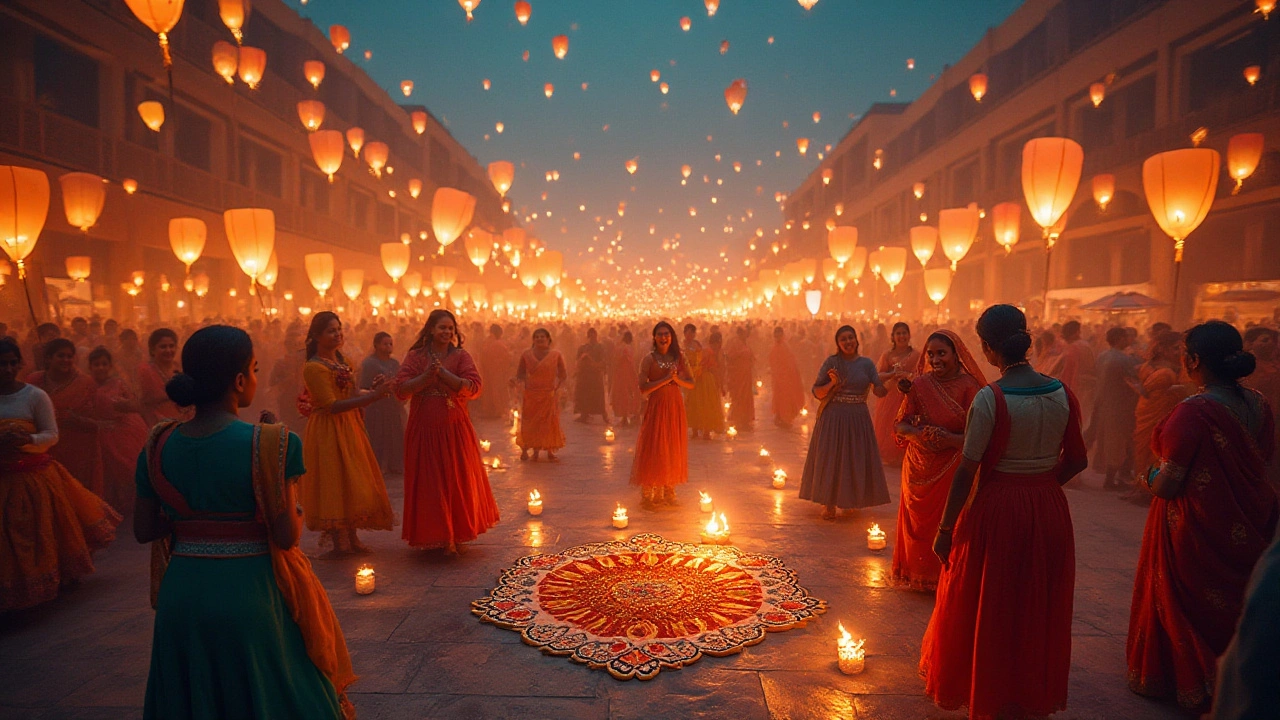The Enchanting Beauty of India: A Journey Through Culture and Tradition
 Jan, 10 2025
Jan, 10 2025
India is a land of great diversity, a vast mosaic where different elements come together to form an extraordinary whole. Its beauty is not just limited to its breathtaking landscapes but extends deep into its culture and traditions. With regions vastly different from one another, there is always something new to discover and marvel at.
The spiritual essence of India has been a source of wisdom for centuries, reflected in its life quotes that resonate with truth and depth. People from all walks of life have found inspiration and solace in these words, carrying them forward through generations.
Even amidst modern developments, India retains its cultural richness, often blending old with new in seamless harmony. This timeless balance between tradition and innovation is just one of the many aspects that make India so captivating and beautiful.
- Diverse Landscapes and Natural Wonders
- Rich Cultural Heritage and Traditions
- Spiritual Wisdom and Life Quotes
- Modern India: A Blend of Tradition and Innovation
Diverse Landscapes and Natural Wonders
When you set foot on Indian soil, one of the first things that strike you is the sheer diversity of its natural beauty. From the arid deserts of Rajasthan to the lush green backwaters of Kerala, India is a land of diverse landscapes that defy easy categorization. The majestic Himalayas, stretching across the northern expanse, are not just mountains but a realm of spirituality and adventure for many. This range is home to some of the highest peaks in the world, including Mount Everest's sister, Kanchenjunga, which stands as an iconic landmark on the country's northeastern frontier.
The Indian subcontinent's geography is a vibrant tapestry of rich ecosystems. The enchanting Sunderbans, with their intertwining mangrove forests, offer a home to the elusive Bengal tiger, symbolizing India's commitment to preserving its wildlife. Alongside these forests, India's rivers, such as the sacred Ganges, serve as lifelines for millions, carrying both cultural and religious significance. A journey along the river provides glimpses into the daily lives of those who reside by its banks, living in harmony with nature.
In central India, the rich biodiversity of locations like the Western Ghats, one of the world's biodiversity hotspots, showcases a plethora of flora and fauna. From the colorful orchids that decorate the hillsides to the rare bird species that fill the skies, nature here paints a masterpiece that inspires awe and reverence. These hills are not just a feast for the eyes but also a sanctuary for environmentalists striving to protect this precious heritage. It's said that over 3,000 species of flowering plants can be found in these regions alone.
Heading to the coastline, India's beaches promise tranquility and adventure alike. Whether it's the popular shores of Goa where international tourists and backpackers find solace, or the untouched beaches of the Andaman and Nicobar Islands with their pristine beauty, India's coastlines cater to all sorts of travelers. With over 7,500 kilometers of coastline, these beaches are perfect spots for watching mesmerizing sunsets that color the sky with hues of orange and pink, leaving onlookers enchanted.
As you explore these marvels, you might hear the words of Rabindranath Tagore whispering in the winds. He eloquently wrote, "The traveller has to knock at every alien door to come to his own, and one has to wander through all the outer worlds to reach the innermost shrine at the end."
Tagore's words beautifully capture the essence of exploring India's myriad landscapes, urging each traveler to experience the beauty and find a connection deeper than the physical terrain.
Whether you find inspiration in the towering peaks, the vast deserts, or the serene waters, India's natural wonders are a testament to the earth's capacity for beauty. Each region offers something unique, contributing to the overall allure of this extraordinary country. Exploring these landscapes is not just about witnessing beauty but also about understanding the deep cultural and historical ties that bind these places to the people of India.

Rich Cultural Heritage and Traditions
India's culture and traditions are woven with vibrant threads that date back thousands of years. A distinctive aspect of Indian heritage is its architecture, with structures like the Taj Mahal and the ancient temples of Khajuraho showcasing the artistic brilliance of their times. Each state in India offers a unique cultural experience, be it through its dance forms like Kathak in the north and Bharatanatyam in the south, or music traditions such as the classical Hindustani and Carnatic styles. This patchwork of arts and practices highlights a country deeply rooted in its past while contemporaneously embracing modernity.
The traditional festivals of India reflect the country's diverse spiritual fabric. Celebrations such as Diwali, which is the festival of lights, and Holi, known for its riot of colors, are observed with fervor across the nation. These festivals offer a glance into the age-old tales of gods and heroes, echoing the values and beliefs of a bygone era. Additionally, regional festivals like Pongal and Bihu provide an intimate look into the agrarian lifestyle and seasonal rituals that have remained unchanged in many rural landscapes.
Clothing in India showcases its cultural depth, with garments like the saree, salwar kameez, and dhoti epitomizing traditional attire for millions. These garments are not just dresses but often tell stories through their intricate designs and motifs. Textiles like Banarasi silk and Pashmina wool are renowned worldwide, each piece a masterpiece of craftsmanship reflecting India’s rich tradition. The techniques used by artisans have been handed down through generations, ensuring that the skills are kept alive and thriving.
India's literary heritage contributes significantly to its cultural wealth. From ancient texts like the Vedas and Upanishads to the epic tales of the Mahabharata and Ramayana, Indian literature encapsulates wisdom that transcends ages. These texts have greatly influenced thinking and philosophy not only in India but also in many parts of the world. Modern Indian literature, represented by authors like Rabindranath Tagore and Salman Rushdie, continues to captivate readers globally. Padma Lakshmi once said,
"The true essence of India is its openness and acceptance, a lesson embodied in every literary work that has emerged from its vast expanse."
The tradition of India also shines in its culinary arts, where the use of spices and intricate cooking methods have crafted a global palate known for its depth and variety. Whether it's the fiery curries of the south or the sweet delights of the north, Indian food is a revelation. The philosophy behind Indian cuisine, which includes Ayurvedic principles and regional variations, speaks volumes about the nation's narrative of health and nutrition that has passed down through generations.

Spiritual Wisdom and Life Quotes
India, a country renowned for its rich tapestry of spiritual traditions, offers a wealth of wisdom that has been cherished for centuries. The spiritual teachings from various Indian texts such as the Bhagavad Gita, the Upanishads, and Buddhist scriptures provide profound insights into the human condition, personal growth, and the universe. These texts explore concepts of karma, dharma, and moksha, encouraging individuals to lead a life of balance and purpose. Such teachings have transcended borders and time, presenting invaluable guidance to those seeking inner peace and understanding.
Among the myriad of wisdom India offers, its life quotes stand out as beacons of hope and motivation. Quotes such as Mahatma Gandhi's "Be the change you wish to see in the world" continue to inspire people globally to take responsibility for their actions and impact on society. These quotes, although often simple in their phrasing, carry deep messages that resonate with personal journeys, urging individuals to strive for integrity and compassion in their everyday lives. The embrace of these principles can lead to significant transformations at both personal and communal levels.
The Influence of Prominent Spiritual Leaders
Throughout its history, India has been home to numerous spiritual leaders whose teachings have shaped the country's philosophical landscape. Figures like Swami Vivekananda and Rabindranath Tagore have emphasized the importance of self-realization and universal brotherhood, ideas that continue to inspire generations. Vivekananda's teachings on the potential of the human spirit and the power of the mind have encouraged countless individuals to seek self-improvement and contribute positively to society. His belief in the divinity of the soul and the unity of humanity fosters a sense of shared destiny and purpose."You have to grow from the inside out. None can teach you, none can make you spiritual. There is no other teacher but your own soul." – Swami Vivekananda
Tagore's explorations of beauty, love, and freedom through his poetry and prose have highlighted the interconnectedness of human experiences and the natural world. His works remind us of the beauty in simplicity and the importance of living authentically. Embracing such perspectives can guide individuals towards a more fulfilled and harmonious existence, fostering connections with others and the world around them. These teachings illustrate how spiritual wisdom can be seamlessly integrated into daily life, enriching our experiences and broadening our horizons.
The Role of Rituals and Practices
The spiritual fabric of India is also woven through its diverse rituals and practices, each offering unique insights into the pursuit of happiness and enlightenment. Practices such as yoga and meditation have long been integral to Indian spirituality, now embraced worldwide for their mental and physical benefits. Yoga's emphasis on harmony between body, mind, and spirit aligns with India's holistic worldview, promoting well-being and self-awareness. Meditation, on the other hand, offers a path inward, allowing individuals to quiet their minds and find peace amidst a bustling world.These practices, deeply rooted in tradition, have been scientifically shown to reduce stress, enhance focus, and improve overall quality of life. They speak to the Indian belief in the power of introspection and mindfulness as tools for navigating the complexities of existence. Engaging in such practices can lead to experiences of profound stillness and realization, providing clarity and perspective in an often chaotic world. Through these rituals, India's spiritual wisdom extends beyond its borders, inviting people everywhere to explore the vast depths of their own inner landscapes.

Modern India: A Blend of Tradition and Innovation
India today stands as a nation poised on the brink of its greatest transformations, a place where the beauty of age-old traditions weaves seamlessly into the bold steps of technological advancement and progress. In the bustling cities like Bengaluru and Hyderabad, we witness the vibrant energy of tech-driven innovations that have earned India the moniker of the 'IT hub' of the world. Yet, look a little deeper, and you observe something profound: amid glass skyscrapers and innovation hubs, ancient traditions continue to thrive, untouched and cherished. This juxtaposition is not random but a testament to the core ethos of India, where the past and future dance in harmony.
At Indian weddings, for example, the coexistence of tradition and modernity is palpable. While a young couple might exchange their vows beneath glittering fairy lights strung high in sprawling hotel banquet halls, they still hold to customs passed down by generations: the henna-clad hands, the sacred fire ritual, and the traditional attire. Through this wise blending, individuals pay homage to their roots while embracing the new, creating something uniquely their own. This attitude resonates across the country, evident in culinary spaces, art forms, and even fashion, where traditional attire like the sari is reimagined with contemporary twists.
As the economic landscape continues to evolve, India is becoming a hub for startups and innovators. According to the NASSCOM report, India houses about 95 active unicorns as of 2022, making it one of the fastest-growing startup environments globally. Such agility allows the economy to pivot and adapt to global demands while nurturing local talent and ideas. Despite this rapid development, India's spiritual wisdom remains a guide for ethical progress. As Mahatma Gandhi once emphasized, we must "live as if you were to die tomorrow, learn as if you were to live forever."
Even today, this principle serves as a beacon for those navigating the nexus of progress and rootedness.
The education sector is another area where tradition and innovation blend magnificently. Institutions with a storied history, like Banaras Hindu University, now incorporate cutting-edge research alongside ancient knowledge systems. Technological strides enable remote learning, helping spread educational resources to remote corners of the country while respecting the regional languages and cultures pivotal to India's rich academic tradition. This prevailing duality stands as a reminder that growth doesn't necessitate the erasure of the past but can rather be an enhancement, drawing strength from the wisdom of the ages while stepping boldly into what the future holds.
From art and architecture to social reforms, the nation continually seeks a balance. New-age artists draw inspiration from traditional motifs, filtering them through a modern lens to create pieces resonating on an international scale. Social reforms, too, embrace progressive ideals while adhering to time-honored cultural values, ensuring that the advancements are inclusive and respectful. This intricate tapestry of culture and tradition underlines the essence of India, making it not just a place but an evolving idea—a kaleidoscope of beauty in constant motion.